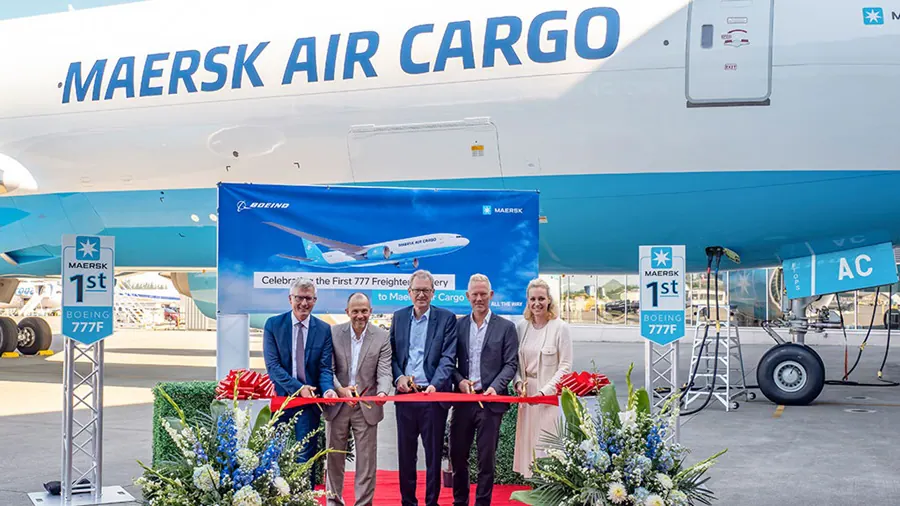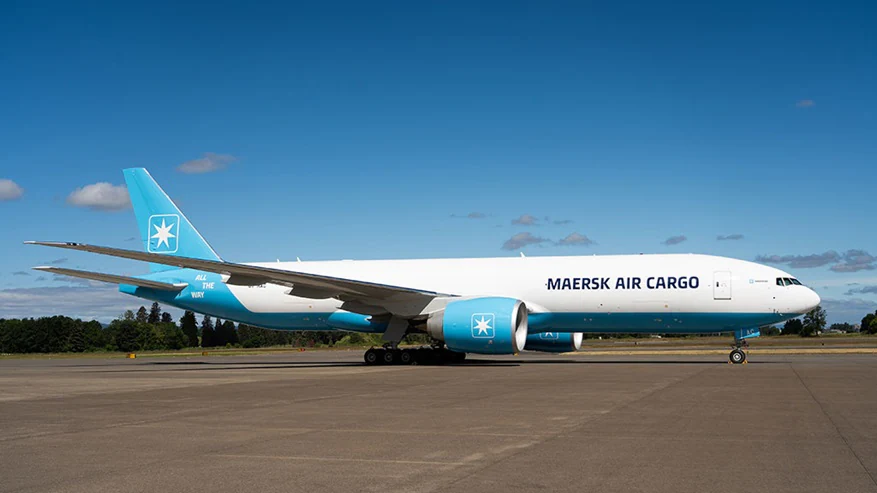
Maersk customers will benefit from the delivery of the first Boeing 777F
- Maersk Air Cargo takes delivery of first Boeing 777 owned by a Danish airline
- Arrival in Billund (DK) scheduled for 13 July, second 777F to arrive later in Q3
- Up to 6 direct weekly flights between China and Northern Europe with increased capacity
Copenhagen/Seattle : Maersk Air Cargo (MAC) took delivery of its first of two new Boeing 777F. It’s the first Boeing 777 owned by a Danish airline. The hand-over was celebrated at Boeing’s headquarters in Seattle, USA. Maersk Air Cargo is a part of the global integrator of logistics, A.P. Moller – Maersk. The arrival of Maersk’s first Boeing 777F at it’s home airport Billund in Denmark is planned for Saturday, 13 July.

Especially Maersk’s air freight customers in China and Europe will benefit from increased capacity and efficiency by the introduction of the two Boeing 777F. Both will be deployed on Maersk’s existing Europe-China route with initially three weekly flights, and later up to six weekly flights. Besides more capacity on direct routes the 777Fs will ensure shorter transit times as well as faster handling times and quality at origin and destination.
Maersk ordered the two 777Fs in November 2021 as part of the modernization of its fleet. The delivery of the second aircraft is scheduled later in Q3. Maersk Air Cargo’s owned controlled fleet will then comprise of two Boeing 777F and 20 Boeing 767F.
We are delighted to take this important delivery and upgrade our fleet with two of the largest and most reliable freighters available on the market. With this step we are entering the premier league of cargo aviation. The B777F can transport more than double of payload on each flight compared to our 767Fs, and it is the most fuel-efficient aircraft in the world with the GE90 engines.
From a commercial perspective the two Boeing 777Fs are a giant leap in terms of what we can offer our air freight customers going forward. Besides enabling a much more efficient route structuring our 777Fs will improve the availability of space for our customers as we see a growing demand for integrated supply chain solutions which include air. Due to the disruptive environment in logistics, a rising number of cargo owners are choosing to reduce the number of service providers in their supply chain. Increased visibility across fewer providers enables the cargo owners to react more swiftly and much better informed in case of disruption. Availability of air freight capacity and full asset control are important aspects here. Both increase the levels of resilience, visibility and flexibility which are essential in these disruptive times.
Narin Phol
Executive Vice President and Chief Product Officer (CPO) for Logistics and Services at Maersk
The Boeing 777F can fly up to 9,200 kilometers (4,970 nautical miles) and carry a maximum payload of 102,000 kilograms. The main deck fits pallets up to 3 metres high, and all cargo decks are temperature controlled. The Onboard Network System allows connected cargo in the future. Maersk chose GE90 engines for its 777F which are the world’s most powerful and reliable commercial jet engines.
Besides its owned controlled fleet, Maersk is loading a large part of the air freight volumes also on commercial flights of other airlines. With its modern air freight booking tool on Maersk.com customers can choose and directly book more than 70,000 airport pairs across more than 90 countries with instant pricing and optional value adding services. Maersk Air Freight ranks among the top 20 air freight forwarders globally, and is among the top 10 in Germany and The Netherlands.
About Maersk
A.P. Moller – Maersk is an integrated logistics company working to connect and simplify its customers’ supply chains. As a global leader in logistics services, the company operates in more than 130 countries and employs around 100,000 people. Maersk is aiming to reach net zero emissions by 2040 across the entire business with new technologies, new vessels, and green fuels.
